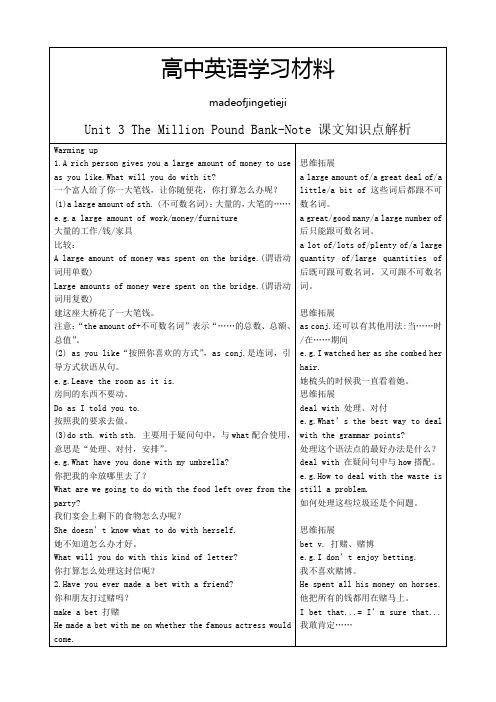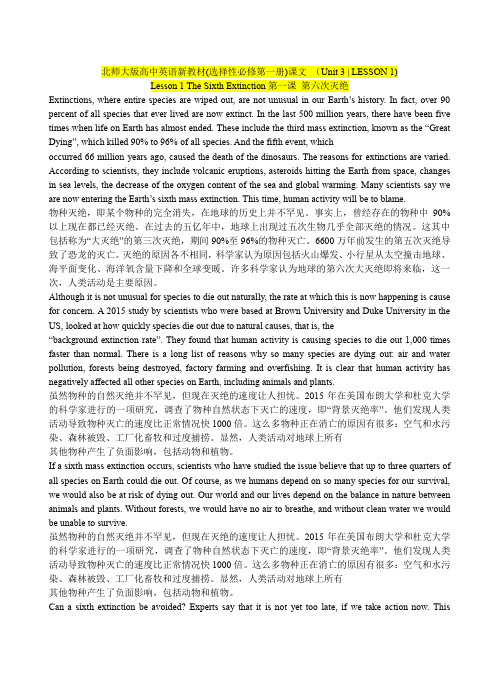课文 Unit3讲解
- 格式:ppt
- 大小:7.12 MB
- 文档页数:69

u n i t3T h e L a n d o f t h e L o c k课文译文许多年前,在美国,家家户户白天黑夜不锁门是司空见惯的。
在本文中,格林叹惜人们不再相互信任,不得不凭借精密的安全设备来保护自己和财产。
锁之国鲍伯·格林1 小时候在家里,我们的前门总是夜不落锁。
我不知道这是当地的一种说法还是大家都这么说;"不落锁"的意思是掩上门,但不锁住。
我们谁都不带钥匙;晚上最后一个回家的人把门关上,这就行了。
2 那样的日子已经一去不复返了。
在乡下,在城里,门不再关着不锁上,哪怕是傍晚一段时间也不例外。
3 在许多方面,郊区和农村甚至比巡查严密的城市街道更易受到攻击。
统计显示,那些据称是安宁的地区的犯罪率上升得比城镇更为显著。
不管怎么说,前门虚掩不落锁的时代是一去不复返了。
4 取而代之的是防盗锁、防护链、电子报警系统,以及连接警署或私人保安公司的报警装置。
郊区的许多人家在露台上安装了玻璃滑门,内侧有装得很讲究的钢条,这样就没人能把门撬开。
5 在最温馨的居家,也常常看得到窗上贴着小小的告示,称本宅由某家安全机构或某个保安公司负责监管。
6 锁成了美国的新的象征。
的确,一家大保险公司最近的一则公益广告没有用图表表明我们所处的危险有多大,而是用了一幅童车的图片,车身上悬着如今无所不在的挂锁。
7 广告指出,没错,确是保险公司理赔失窃物品,但谁来赔偿互不信任、担心害怕这种新氛围对我们的生活方式所造成的影响呢?谁来对美国从自由之国到锁之国这一蜕变作出精神赔偿呢?8 因为那就是现状。
我们已经变得如此习惯于保护自己不受美国生活新氛围的影响,如此习惯于设置障碍,因而无暇考虑这一切意味着什么。
9 出于某种原因,当我们觉得防范周密时就感到心满意足;我们没有问过自己:为什么会出现这种情况?为什么非得把自己与邻居和同住一城的居民相隔绝,这一切究竟是从什么时候开始主宰我们生活的?10 这一切确是主宰了我们的生活。

八年级英语Unit3 Could you please clean your room课文讲解Unit 3: Could You Please Clean Your Room?n A:1."Peter。
could you please take out the trash?" This is apolite request asking Peter to take out the garbage。
"Could you please do something?" is a polite way to ask for ___ or assistance。
"Could" is a more polite way to ask than "can." The response tothis request can be "Sure," "Of course," "Certainly," or "No problem." If the person cannot do it。
they can say "Sorry。
Ican't." "Take out" means to remove something from a place。
When using a pronoun as the object。
it should be placed in the middle of the phrase。
For example。
"You can take it out."2."Can you do the dishes?" This is asking if the person can wash the dishes。

七年级英语上册Unit 3课文讲解1.Where is the dining hall? 餐厅在哪里?【用法详解】特殊疑问词where,译为“在哪里”,引导的特殊疑问句用来询问“某人或某物在哪里”。
注意:be动词要与主语的人称和数保持一致。
Eg: Where is your English book? 你的英语书在哪?Where are my keys? 我的钥匙在哪?【即学即用】( D )1.-- _____ my shoes?-- They’re unde r the beD.A.WhereB.Where’sC.Where’reD.Where are2.It’s in front of the art building. 在艺术楼前面。
【易混辨析】 in front of与in the front of的区别:In front of 译为“在...前面”,强调在物体的外部的前面In the front of 译为“在...前面”,强调在物体内部的前面Eg: There is a tree in front of our classroom. 我们教室前有一棵树。
(树在教室外面)There is a blackboard in the front of our classroom. 我们教室前有一块黑板。
(黑板在教室内部)【即学即用】( B )1.Tony is too short, so he sits ______ the classroom.A.in front ofB.in the front ofC.at the back ofD.at back of( C )2.There is a park _____ our school.A.In frontB.in the frontC.in front ofD.in the front of3.The teachers’ building is across from the school hall. 教师办公楼在学校礼堂对面。

外研版七年级上册新教材(讲义)Unit 3 Family ties重点短语the meaning of family 家庭的意义communicate with 与…联系each other 互相by the end of 到…为止make a photo album 制作相册be able to 能talk about 讨论family moment 家庭时刻each person 每个人stand for 代表on the right 在右边answer the question 回答问题an older man 年长的男人a strict face 严肃的面孔a touching story 一个感人的故事be absent from 缺席take over 接管along the way 随着时间的推移turn to 向…求助in order to do 为了做solve problems 解题Chinese saying 汉语语句give advice 劝告advise - advice (不可数) 建议v.-建议n.(不可数)suggest - suggestion(s)建议v.-建议n. (s) family relationship 家庭关系dress up 打扮the school ride bike 学校骑自行车be close to 接近a serious disease 严重的疾病not....at all 根本没有...have to 不得不has to 不得不at home 在家every day 每天start to do 开始做某事across the cold river 穿过冰冷的河流run down 撞倒grow - growth 生长生长give sth. to sb. 给某人某物look for 寻找Actions speak louder than words.事实胜于雄辩。



1杨磊译注必修三Unit 3 课文详解必修三 Unit 3 The Million Pound Band Note百万英镑Act I, Scene 3Narrator: It is the summer of 1903.Two old and wealthy brothers, Roderick 年的夏天。
这是1903and Oliver, have made a bet.两个年迈而富有的兄弟:罗德里克和奥利弗,进行打赌。
【注释:make a betOliver believes that with a 】。
我擅长打足彩football 310.310eg. I'm good at making a bet on 打赌million pound bank note a man could survive a month in London.奥利弗认为一个拥有一百万英镑支票的人能在伦敦生存一个月。
【注释:survive vi.幸存, 活下来eg. These plants cannot survive in very coldHis brother Roderick doubts it. At this他的哥哥对此怀疑。
conditions.这些植物在严寒中不能存活。
】moment, they see a penniless yound man wandering on the pavement outside their house.就在这时,他们看见一位身无分文的年轻人正在他家外的人行道上徘徊。
【注释:on the pavement徘徊街头,没有住处,被遗弃;wandering adj. 漫游的;闲逛的;(精神)恍惚的;错乱的eg. 1) wandering thoughts 错It is Henry Adams,】2) I felt my attention wandering during the lecture.我感到听讲座时老走神。

Unit3What is your school like? 课文重点知识和语法讲解一、重要短语1.in front of 在…前面2.next to紧挨着3.across from在…对面4.between…and….在…和…之间5.be amazed at…对…感到惊讶6.in the middle of…在…中间7.at the back of…在…后面8.put up important notices张贴重要的告示9.on the sports field 在运动场上10.s ome pictures of famous people一些名人的照片11.o n the wall在墙上12.t he teacher’s desk 讲桌13.l ist your favorite places 例举出你最喜欢的地点14.s hare …with 与…分享15.b e different from 与…不同16.m any modern buildings 许多现代的大楼17.d o exercises 做体操18.r aise the flag 升旗19.a special way 一种特殊的方式20.s tart the week 开始这周21.m ost of the time大半部分时间22.c hange seats换座位23.m y best friend 我最好的朋友24.m any kinds of food许多种类的食物25.b e similar to 与…相似26.B ye for now再见27.m y favorite place 我最喜欢的地方28.a group of 一群…29.t ake turns to do 轮流做某事30.t he locations of things物品的位置31.i ntroduce my school 介绍我的学校32.d escribe the places I like 描述我喜欢的地点33.s tart our dreams 开始我们的梦想二、重要句型知识点讲解1.It’s in front of the art building. 它在艺术楼的前面【辨析】in front of 与in the front ofin the front of... 在……(里面的)前部反义词组:at the back of...在……后面in front of...在……(外部的)前面反义词:behind在……后面He is standing in front of the car.他站在汽车前面。


北师大版高中英语新教材(选择性必修第一册)课文(Unit 3 | LESSON 1)Lesson 1 The Sixth Extinction第一课第六次灭绝Extinctions, where entire species are wiped out, are not unusual in our Earth’s history. In fact, over 90 percent of all species that ever lived are now extinct. In the last 500 million years, there have been five times when life on Earth has almost ended. These include the third mass extinction, known as the “Great Dying”, which killed 90% to 96% of all species. And the fifth event, whichoccurred 66 million years ago, caused the death of the dinosaurs. The reasons for extinctions are varied. According to scientists, they include volcanic eruptions, asteroids hitting the Earth from space, changes in sea levels, the decrease of the oxygen content of the sea and global warming. Many scientists say we are now entering the Earth’s sixth mass extinction. This time, human activity will be to blame.物种灭绝,即某个物种的完全消失,在地球的历史上并不罕见。

七年级上册英语第三单元课文讲解
七年级上册英语第三单元的课文讲解是关于"Unit 3 My Friends"。
这个单元主要介绍了一位新同学的自我介绍和谈论
朋友的话题。
以下是这个单元的几篇课文及其讲解:
1. Lesson 1: Introducing Helen
这篇课文是一位新同学Helen的自我介绍。
她具体介绍了自己
的名字、年龄、家庭成员和兴趣爱好等。
这篇课文的目的是让学生学会用简单的句子介绍自己。
2. Lesson 2: My Best Friend
这篇课文讲述了一个学生Tony的最好朋友Daniel。
Tony介绍
了Daniel长什么样子、有什么特点以及他们一起做了些什么。
这篇课文的目标是让学生学会用英语描述自己的朋友和朋友间的活动。
3. Lesson 3: Friends Around the World
这篇课文介绍了一些来自不同国家的学生,让学生了解到世界上有不同种族和文化的人。
通过这篇课文,学生可以了解到不同国家的人们在生活中的一些不同点。
4. Lesson 4: My Favorite Day
这篇课文讲述了一个学生Sandy在学校里最喜欢的一天,包括上课内容和和朋友一起做的活动。
通过这篇课文,学生可以学会用英语描述自己最喜欢的一天的活动。
以上是七年级上册英语第三单元的几篇课文及其简要讲解。
这
些课文旨在帮助学生学会用简单的句子介绍自己、描述朋友的外貌特点、描述朋友间的活动,以及了解到不同国家的人们的生活习惯和文化差异。
